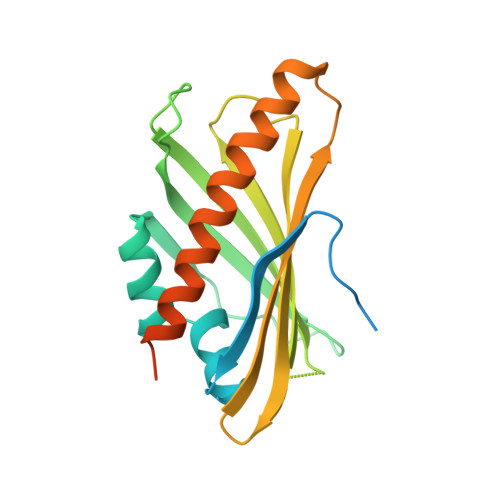Aster Proteins Facilitate Nonvesicular Plasma Membrane to ER Cholesterol Transport in Mammalian Cells.
Sandhu, J., Li, S., Fairall, L., Pfisterer, S.G., Gurnett, J.E., Xiao, X., Weston, T.A., Vashi, D., Ferrari, A., Orozco, J.L., Hartman, C.L., Strugatsky, D., Lee, S.D., He, C., Hong, C., Jiang, H., Bentolila, L.A., Gatta, A.T., Levine, T.P., Ferng, A., Lee, R., Ford, D.A., Young, S.G., Ikonen, E., Schwabe, J.W.R., Tontonoz, P.(2018) Cell 175: 514-529.e20
- PubMed: 30220461
- DOI: https://doi.org/10.1016/j.cell.2018.08.033
- Primary Citation of Related Structures:
6GQF - PubMed Abstract:
The mechanisms underlying sterol transport in mammalian cells are poorly understood. In particular, how cholesterol internalized from HDL is made available to the cell for storage or modification is unknown. Here, we describe three ER-resident proteins (Aster-A, -B, -C) that bind cholesterol and facilitate its removal from the plasma membrane. The crystal structure of the central domain of Aster-A broadly resembles the sterol-binding fold of mammalian StARD proteins, but sequence differences in the Aster pocket result in a distinct mode of ligand binding. The Aster N-terminal GRAM domain binds phosphatidylserine and mediates Aster recruitment to plasma membrane-ER contact sites in response to cholesterol accumulation in the plasma membrane. Mice lacking Aster-B are deficient in adrenal cholesterol ester storage and steroidogenesis because of an inability to transport cholesterol from SR-BI to the ER. These findings identify a nonvesicular pathway for plasma membrane to ER sterol trafficking in mammals.
Organizational Affiliation:
Department of Pathology and Laboratory Medicine, University of California, Los Angeles, Los Angeles, CA 90095, USA; Molecular Biology Institute, University of California, Los Angeles, Los Angeles, CA 90095, USA.
















